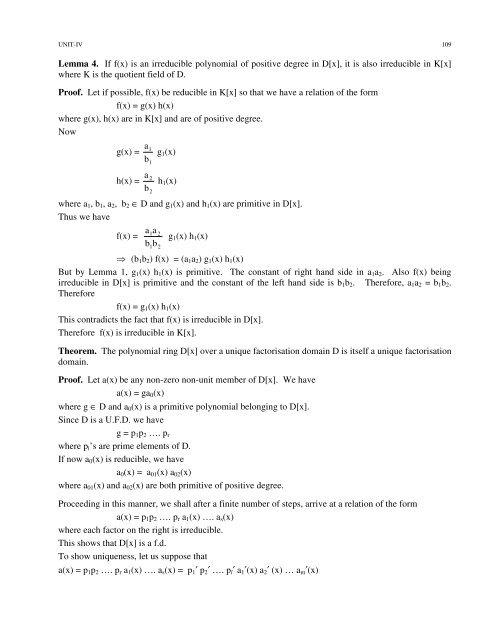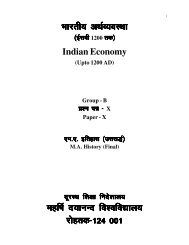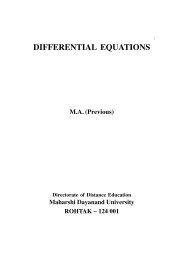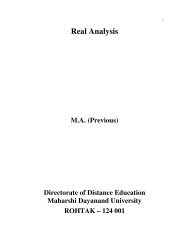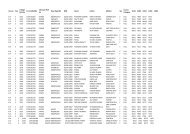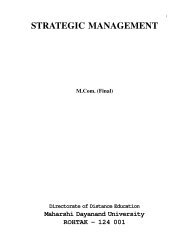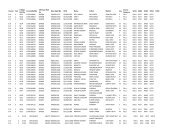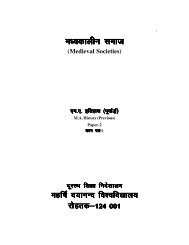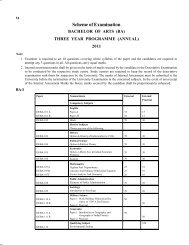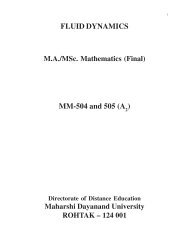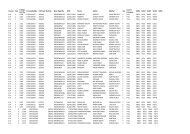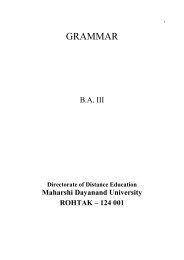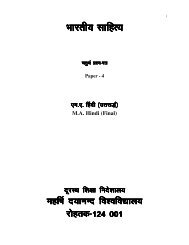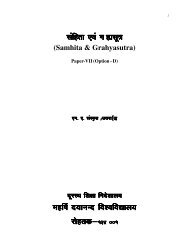Advanced Abstract Algebra - Maharshi Dayanand University, Rohtak
Advanced Abstract Algebra - Maharshi Dayanand University, Rohtak
Advanced Abstract Algebra - Maharshi Dayanand University, Rohtak
Create successful ePaper yourself
Turn your PDF publications into a flip-book with our unique Google optimized e-Paper software.
UNIT-IV 109<br />
Lemma 4. If f(x) is an irreducible polynomial of positive degree in D[x], it is also irreducible in K[x]<br />
where K is the quotient field of D.<br />
Proof. Let if possible, f(x) be reducible in K[x] so that we have a relation of the form<br />
f(x) = g(x) h(x)<br />
where g(x), h(x) are in K[x] and are of positive degree.<br />
Now<br />
g(x) =<br />
h(x) =<br />
a<br />
b<br />
1<br />
1<br />
a<br />
b<br />
2<br />
2<br />
g 1 (x)<br />
h 1 (x)<br />
where a 1 , b 1 , a 2 , b 2 ∈ D and g 1 (x) and h 1 (x) are primitive in D[x].<br />
Thus we have<br />
a1a<br />
2<br />
f(x) = g 1 (x) h 1 (x)<br />
b b<br />
1<br />
2<br />
(b 1 b 2 ) f(x) = (a 1 a 2 ) g 1 (x) h 1 (x)<br />
But by Lemma 1, g 1 (x) h 1 (x) is primitive. The constant of right hand side in a 1 a 2 . Also f(x) being<br />
irreducible in D[x] is primitive and the constant of the left hand side is b 1 b 2 . Therefore, a 1 a 2 = b 1 b 2 .<br />
Therefore<br />
f(x) = g 1 (x) h 1 (x)<br />
This contradicts the fact that f(x) is irreducible in D[x].<br />
Therefore f(x) is irreducible in K[x].<br />
Theorem. The polynomial ring D[x] over a unique factorisation domain D is itself a unique factorisation<br />
domain.<br />
Proof. Let a(x) be any non-zero non-unit member of D[x]. We have<br />
a(x) = ga 0 (x)<br />
where g ∈ D and a 0 (x) is a primitive polynomial belonging to D[x].<br />
Since D is a U.F.D. we have<br />
g = p 1 p 2 …. p r<br />
where p i ’s are prime elements of D.<br />
If now a 0 (x) is reducible, we have<br />
a 0 (x) = a 01 (x) a 02 (x)<br />
where a 01 (x) and a 02 (x) are both primitive of positive degree.<br />
Proceeding in this manner, we shall after a finite number of steps, arrive at a relation of the form<br />
a(x) = p 1 p 2 …. p r a 1 (x) …. a s (x)<br />
where each factor on the right is irreducible.<br />
This shows that D[x] is a f.d.<br />
To show uniqueness, let us suppose that<br />
a(x) = p 1 p 2 …. p r a 1 (x) …. a s (x) = p 1 ′ p 2 ′ …. p l ′ a 1 ′(x) a 2 ′ (x) … a m ′(x)


